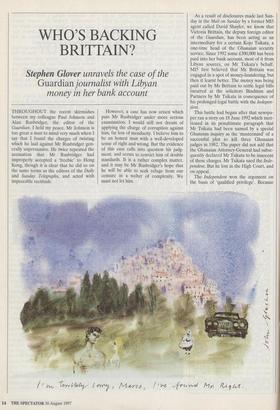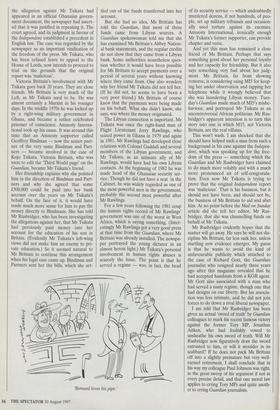WHO'S BACKING BRITTAIN?
Stephen Glover unravels the case of the Guardian journalist with Libyan money in her bank account
THROUGHOUT the recent skirmishes between my colleague Paul Johnson and Man Rusbridger, the editor of the Guardian, I held my peace. Mr Johnson is too great a man to mind very much when I say that I found the charges of twisting which he laid against Mr Rusbridger gen- erally unpersuasive. He twice repeated the accusation that Mr Rusbridger had improperly accepted a 'freebie' to Hong Kong, though it is clear that he did so on the same terms as the editors of the Daily and Sunday Telegraphs, and acted with impeccable rectitude. However, a case has now arisen which puts Mr Rusbridger under more serious examination. I would still not dream of applying the charge of corruption against him, far less of mendacity. I believe him to be an honest man with a well-developed sense of right and wrong. But the evidence of this case calls into question his judg- ment, and seems to convict him of double standards. It is a rather complex matter, and it may be Mr Rusbridger's hope that he will be able to seek refuge from our censure in a welter of complexity. We must not let him. As a result of disclosures made last Sun- day in the Mail on Sunday by a former MI5 agent called David Shayler, we know that Victoria Brittain, the deputy foreign editor of the Guardian, has been acting as an intermediary for a certain Kojo Tsikata, a one-time head of the Ghanaian security service. Since 1992 some £300,000 has been paid into her bank account, most of it from Libyan sources, on Mr Tsikata's behalf. MI5 first believed that Ms Brittain was engaged in a spot of money-laundering, but then it learnt better. The money was being paid out by Ms Brittain to settle legal bills incurred at the solicitors Bindman and Partners by Mr Tsikata in consequence of his prolonged legal battle with the Indepen- dent.
This battle had begun after that newspa- per ran a story on 18 June 1992 which men- tioned in its penultimate paragraph that Mr Tsikata had been named by a special Ghanaian inquiry as the 'mastermind' of a successful plot to kill three Ghanaian judges in 1982. The paper did not add that the Ghanaian Attorney-General had subse- quently declared Mr Tsikata to be innocent of these charges. Mr Tsikata sued the Inde- pendent. But he lost in the High Court, and on appeal.
The Independent won the argument on the basis of 'qualified privilege'. Because the allegation against Mr Tsikata had appeared in an official Ghanaian govern- ment document, the newspaper had assert- ed that it was justified in repeating it. The court agreed, and its judgment in favour of the Independent established a precedent in English law. The case was regarded by the newspaper as an important vindication of the freedom of the press. Mr Tsikata, who has been refused leave to appeal to the House of Lords, now intends to proceed to trial on the grounds that the original report was 'malicious'.
Victoria Brittain's involvement with Mr Tsikata goes back 20 years. They are close friends. Ms Brittain is very much of the Left, as Mr Tsikata used to be. He was almost certainly a Marxist in his younger days. In the middle 1970s he was locked up by a right-wing military government in Ghana, and became a rather celebrated prisoner of conscience. Amnesty Interna- tional took up his cause. It was around this time that an Amnesty supporter called Geoffrey Bindman — now the senior part- ner of the very same Bindman and Part- ners — became involved in the case of Kojo Tsikata. Victoria Brittain, who was soon to edit the 'Third World page' on the Guardian, became Mr Tsikata's friend.
Her friendship explains why she pointed him in the direction of Bindman and Part- ners and why she agreed that some £300,000 could be paid into her bank account over the years on Mr Tsikata's behalf. On the face of it, it would have made much more sense for him to pay the money directly to Bindmans. She has told Mr Rusbridger, who has been investigating the allegations against her, that Mr Tsikata had previously paid money into her account for the education of his son in Britain. (Evidently Mr Tsikata's left-wing views did not make him an enemy to pri- vate education.) So it seemed natural to Ms Brittain to continue this arrangement when his legal case came up. Bindman and Partners sent her the bills, which she set- tied out of the funds transferred into her account.
But she had no idea, Ms Brittain has told the Guardian, that most of these funds came from Libyan sources. A Guardian spokeswoman told me that she has examined Ms Brittain's Abbey Nation- al bank statements, and the regular credits do not show that they came from a Libyan bank. Some authorities nonetheless ques- tion whether it would have been possible for Ms Brittain to accept payments over a period of several years without knowing where they came from. One also wonders why her friend Mr Tsikata did not tell her. (If he did not, he seems to have been a very poor friend.) Ms Brittain of course knew that the payments were being made on his behalf. What she didn't know, she says, was where the money originated.
The Libyan connection is important. Mr Tsikata was once the right-hand man of Flight Lieutenant Jerry Rawlings, who seized power in Ghana in 1979 and again in 1981. Mr Rawlings had developed close relations with Colonel Gaddafi and several members of the Libyan government, and Mr Tsikata, as an intimate ally of Mr Rawlings, would have had his own Libyan contacts. At the beginning of 1982 he was made head of the Ghanaian security ser- vice. Though he did not have a seat in the Cabinet, he was widely regarded as one of the most powerful men in the government, probably the second most powerful after Mr Rawlings.
For a few years following the 1981 coup the human rights record of Mr Rawlings' government was one of the worst in West Africa, which is saying something. (Inter- estingly Mr Rawlings got a very good press at that time from the Guardian, where Ms Brittain was already installed. The newspa- per portrayed the young dictator in an almost heroic light.) Mr Tsikata's personal involvement in human rights abuses is scarcely the issue. The point is that he served a regime — was, in fact, the head `Bernard loves his pipe.' of its security service — which undoubtedly murdered dozens, if not hundreds, of peo- ple, set up military tribunals and occasion- ally used torture against its enemies. Amnesty International, ironically enough Mr Tsikata's former supporter, can provide chapter and verse.
And yet this man has remained a close friend of Ms Brittain. Perhaps that says something good about her personal loyalty and her capacity for friendship. But it also says something very bad about her judg- ment. Ms Brittain, far from showing remorse, is considering suing MI5 for keep- ing her under observation and tapping her telephone while it wrongly believed that she was laundering Libyan money. Tues- day's Guardian made much of MI5's misbe- haviour, and portrayed Mr Tsikata as an uncontroversial African politician. Mr Rus- bridger's apparent intention is to turn this story into one in which M15, not Victoria Brittain, are the real villains.
This won't wash. I am shocked that she should have helped such a man from such a background in his case against the Indepen- dent, which was speaking up for the free- dom of the press — something which the Guardian and Mr Rusbridger have claimed to do much more volubly and with a much more pronounced air of self-congratula- tion. Even now Mr Tsikata is trying to prove that the original Independent report was 'malicious'. That is his business, but it should not have been, and should not be, the business of Ms Brittain to aid and abet him. At no point before the Mail on Sunday article did she tell her editor, Mr Rus- bridger, that she was channelling funds on behalf of Mr Tsikata.
Mr Rusbridger evidently hopes that the matter will go away. He says he will not dis- cipline Ms Brittain, far less sack her, unless startling new evidence emerges. My guess is that he wants to avoid the kind of unfavourable publicity which attached to the case of Richard Gott, the Guardian journalist who resigned nearly three years ago after this magazine revealed that he had accepted handouts from a KGB agent. Mr Gott also associated with a man who had served a nasty regime, though one that had designs on our liberty. But his associa- tion was less intimate, and he did not join forces to do down a rival liberal newspaper.
I am told that Mr Rusbridger has been given an actual 'sword of truth' by Guardian colleagues to mark his recent famous victory against the former Tory MP, Jonathan Aitken, who had foolishly vowed to unsheathe his own sword of truth. Will Mr Rusbridger now figuratively draw the sword entrusted to him, or will it moulder in its scabbard? If he does not pack Ms Brittain off into a slightly premature but very well- earned retirement, I shall conclude that in his way my colleague Paul Johnson was right, in the great sweep of his argument if not in every precise detail, and that one moral law applies to erring Tory MPs and quite anoth- er to erring Guardian journalists.



















































 Previous page
Previous page